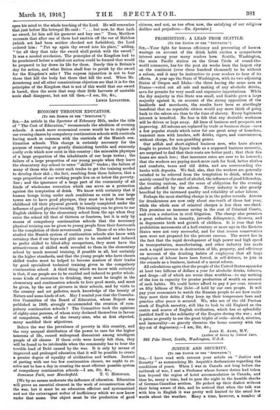PROHIBITION: A LEAD FROM SEATTLE.
[To THE EDITOR 01 THE " SPECTATOR.")
Sre,—Your fight for human efficiency and preventing of human wastage on account of the drink habit excites a sympathetic interest among your many readers here. Seattle, Washington, the main Pacific station on the Great Circle of round-the- world commerce, has for the past six weeks been the largest city on the continent (over three hundred thousand) to be without
a saloon, and it may be instructive to your readers to hear of its effects. A year ago the State of Washington, with its two adjoining States of Oregon and Idaho—the three having the same area as France—voted out all sale and making of any alcoholic drinks, save for permits for very small and expensive importations. While the dry majority in this State was small, and Seattle gave a large majority against it, on account of the strong opposition of the landlords and merchants, the results have been so startlingly beneficial that no reputable citizen would any more think of going back to the saloon era than to the time of slavery. Every legitimate interest is benefited. No fear is felt that any desirable workman will be driven or kept away. All lines of business and prospects are improving. All saloons are replaced by trade or business shops—save a few popular stands which cater for our great army of homeless, transient men with lunches, soft drinks, cigars, and conveniences, without charge, for non-gambling games.
Our selfish and short-sighted business men, who have always fought to protect the liquor trade as a supposed business necessity, are surprised to find that their rents are better paid ; that their fire losses are much less ; that insurance rates are sure to be lowered ; that the workers are paying much more cash for food, better clothes and comforts, taxes and old debts, and are overcrowding the banks with deposits. We find, also, that the workers are generally satisfied to be relieved from the temptation to drink, which was mainly caused by the smell of alcohol, the influence of good fellowship, the treating custom, and the sense of obligation for the evening shelter afforded by the saloon. Every industry is also greatly benefited by the increased quality and reliability of sober labour.
Perhaps the most startling change is in the police records. Arrests for drunkenness are now only about one-tenth of those last year, while the whole sum of criminal charges is less than one-third. This promises an immense saving in the cost of Criminal Courts, and even a reduction in civil litigation. The change also promises a great reduction in insanity, juvenile delinquency, divorces, and in degenerate birth and growth of children. It is true that the prohibition movements of a half-century or more ago in the Eastern States were not very successful, and for that reason conservative men were not prepared for the present success. The secret lies in the fact that the rapid development of high power and high speed in transportation, manufacturing, and other industry has made such a rapid increase in destruction of life, property, and efficiency on account of the drinking habits of employees that all large employers of labour have been forced, in self-defence, to join in the crusade as a business, instead of a moral reform.
All calculations agree that the people of the United States squander at least two billions of dollars a year for alcoholic drinks, tobacco, and drugs—all of which are worse than worthless—to say nothing of the loss in capacity for greater production of wealth on account of such habits. We could better afford to pay 4 per cent. interest on fifty billions of War Debt—if held by our own people. It will pay your economists to watch the Russian people to see how easily they meet their debts if they keep up their temperance laws and practice after peace is secured. We, who are of the old Puritan stock of English ancestry, still like to look to old England as the centre and source of English civilization, which has so splendidly justified itself in the solidarity of the Empire during the war ; and it pains us greatly to see the great triplet of evils—alcohol, nicotine, and immorality—so gravely threaten the home country with the dry-rot of degeneracy.—I am, Sir, &c.,
Joan E. AYER, M.V.
(Author of Living by Natural Las).
905 Pike Street, &talk, Washington, U.S.A.


































 Previous page
Previous page